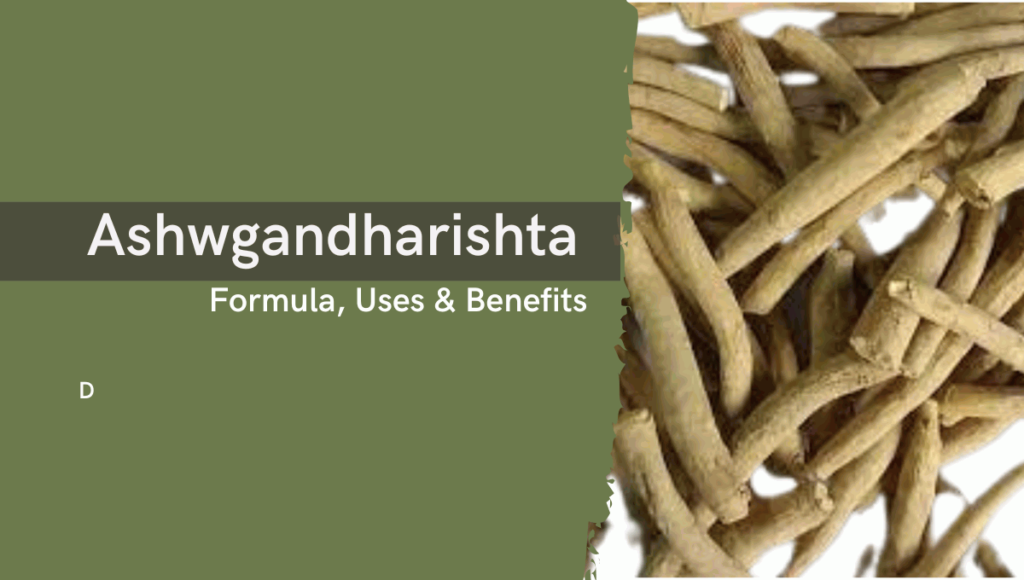Classical Formulations

Ashwagandharishta: Ultimate Health Benefits
Name of the remedy: Ashwagandarishta
Table of Contents
Toggle
What is Ashwagandharishta used for?
Ashwagandharishta, an Ayurvedic classical formulation, is the remedy for Apasmara (epilepsy), Murchha (syncope), Unmada (psychosis), Depression, Anxiety, Schizophrenia, Sluggishness, Dullness, and other memory-related disorders. The roots of Ashwagandha are very efficient in promoting memory, attention, and concentration. It also cures Gonorrhea, Impotence, Hysteria, Piles, Rheumatism, and Heart diseases, as well as increases vigor, strength, and semen in the body. It gives great benefits for Digestive disorders. That’s why it is used successfully when Rheumatic fever starts. provides excellent benefits in women for Heart palpitations, Restlessness, Polyuria, Dyspepsia, constipation, Headache, Debility of old age, etc. If a pregnant woman consumes Ashwagandharishta, she gets great benefits.
Ashwagandharishta, an Ayurvedic classical formulation, is the remedy for Apasmara (epilepsy), Murchha (syncope), Unmada (psychosis), Depression, Anxiety, Schizophrenia, Sluggishness, Dullness, and other memory-related disorders. The roots of Ashwagandha are very efficient in promoting memory, attention, and concentration. It also cures Gonorrhea, Impotence, Hysteria, Piles, Rheumatism, and Heart diseases, as well as increases vigor, strength, and semen in the body. It gives great benefits for Digestive disorders. That’s why it is used successfully when Rheumatic fever starts. provides excellent benefits in women for Heart palpitations, Restlessness, Polyuria, Dyspepsia, constipation, Headache, Debility of old age, etc. If a pregnant woman consumes Ashwagandharishta, she gets great benefits.
Ayurveda Book Reference: Bhaishjya Ratnavali
Classical Formulation of Ashwgandharishta:
Ingredients & Formula for preparation
Crush all ingredients into small pieces, do not make powder. Now prepare a kwath (Decoction) of these herbs.
Remedy of Kwath: Put all the ingredients mentioned above in 190 liters of water and cook it until it remains the 8th part and then strain it.
In this strained decoction,
- Roots of Ashwagandha (Withania Somnifera): 2. 5 kg
- Kali Musli (Curculigo Orchiodes) 800 Gram
- Manjishtha Roots (Rubia Cordifolia) 400 Gram
- Haritaki Chaal (Terminalia Chebula) 400 Gram
- Haridra ( Curcuma Longa) 400 Gram
- Daruhaldi (Berberis Aristata) 400 Gram
- Mulethi Roots(Glycyrrhiza Glabra) 400 Gram
- Rasna Roots(Alpinia Chinensis) 400 Gram
- Vidarikand (Pueraria tuberose)400 Gram
- Arjun Chhal (Terminalia arjuna)400 Gram
- Nagarmotha (Cyperus rotundus) 400 Gram
- Nishoth (Ipomoea turpethum) 400 Gram
- Anantmool (Sariwa ) (Hemidesmus indicus) 320 Gram
- Shyam Sariwa (Ichnocarpus frutescens)320 Gram
- Shwet Chandan (Santalum album) 320 Gram
- Red Chandan(Pterocarpus santalinus) 320 Gram
- Vach (Acorus calamus)320 Gram
- Chitrakamool (Plumbago zeyleynica)320 Gram
Crush all ingredients into small pieces, do not make powder. Now prepare a kwath (Decoction) of these herbs.
Remedy of Kwath: Put all the ingredients mentioned above in 190 liters of water and cook it until it remains the 8th part and then strain it.
In this strained decoction,
- Add 14 kg Real honey and if honey is not found, then add 14 kg old Jaggery.
- Dry Ginger (Zingiber officinalis), Black Pepper (Piper nigrum), and Pipal (Piper longum) total should be 80 grams.
- Dhatkipushp (Woodfordia floribunda) 640 grams,
- Tejpatra (Cinnamomum tamala) 80 Grams
- Fulpriyangu (Callicarpa microphylla) 160 grams
- Nagkesar (Mesua ferrea) 80 grams
- Crush all ingredients and mix all the above ingredients in a clean utensil and cover it with a thick cotton cloth properly and leave it for 1 month. Ashwagandharista will be ready. Later filter them all with a muslin cloth. And fill the bottle.
Doses:
- 4 to 8 grams
- Twice a day in the morning and evening with water.
Brief description of the medicinal properties of herbs used in Ashwgandharishta
MUSLI
As per “Bhavprakash” Musli is Fertile, antioxidant, Anti-inflammatory, Immune- boosting, Anti-diabetic, Cholesterol-lowering, and Aphrodisiac.
Manjishtha
Anti-inflammatory, Antioxidant, Detoxifying, Immune boosting, Blood purifier, Liver Protective properties, and Anti-microbial.
Haritaki
Antioxidant, Anti-inflammatory, Digestive, Neuroprotective, and Antimicrobial.
Turmeric (Haldi)
Anti-inflammatory, Antioxidant, Digestive, Pain relief, Wound healing, Brain Health
Daruhaldi
Anti-inflammatory, Antioxidant, Digestive, Anti-microbial, Skin, and Liver health booster.
Mulethi
Anti-inflammatory, Digestive, Respiratory health Improver, Immune-booster, Skin health booster, Stress Buster.
0